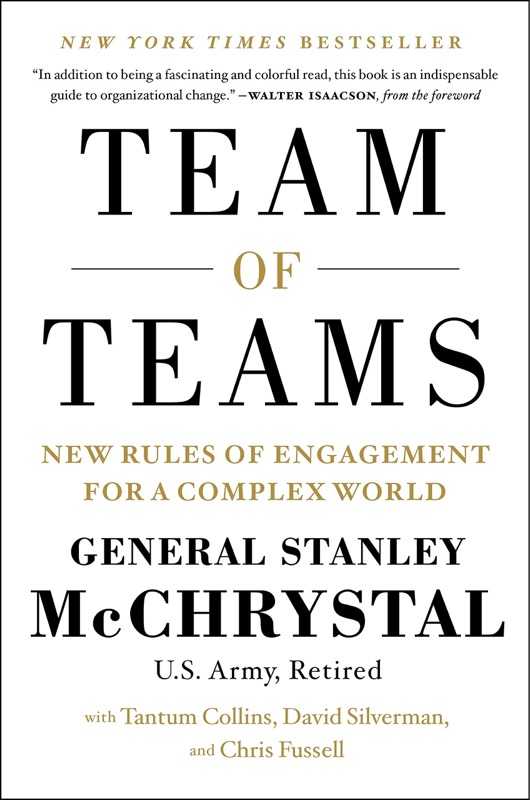Summary
Team of Teams by Gen. Stanley McChrystal presents a modern approach to leading organizations that are responsive and adaptive - two qualities critical when facing into a complex environment.
Today, technology and globalization makes most environments (business or otherwise) more integrated. That tight integration and ability for small actions to have large consequences ripple through the system, mean that systems do not follow easily predictable paths. Context, the unique disposition of elements within the system, and the relationships between actors in the system matter more than the individual parts.
Historically, reductionist management theory championed by Taylor in the early industrial age, led to breakthroughs in productivity. However, the problems this approach was successful at solving were mechanistic, deterministic, and so predictable (at least for experts).
This management theory does not work as well in complex environments. Military philosophy has known this for a long time and it has been further illustrated as warfare has become increasingly characterized as unpredictable network-oriented systems.
This learning can be applied to today's modern business landscape as they increasingly resemble complex networks of actors. Technology proliferation and globalization have increased the interaction between actors and speed of response. The variety and diversity of actors further animates the system in various and unpredictable ways.
In modern complex environments, leaders cannot assess information and respond quickly enough to make systems smarter. Trying to do so makes the system dumber and slower.
Gen. McChrystal advises leaders to consider the following:
- What are the capabilities of your team members? Strengthening their capabilities means they can take on more autonomy.
- What is their autonomy? Do actors (orgs/teams/members) have the authority and ability to take the independent action necessary?
- How do they collaborate? Do actors (orgs/teams/memebers) have the ability to collaborate with others actors quickly and seamlessly? McChrystal places a heavy emphasis on the relationships between actors.
- What is their mission? Do they understand the objectives so that (given suitable capability and autonomy they can navigate towards this direction without direction from an remote actor)
Military Analogy
Gen. McChrystal's use of the military analogy is helpful to illustrate the difference between the simple, complicated, and complex domains.
Although I don't have a military background, I was able to appreciate the difficulty of reacting to an environment that didn't follow simple, predictable rules. The scale wasn't just the size of the problem but the number of various elements of the problem and speed at which they move makes it clear that a centralized decision making system would be ineffective.
The military analogy is often a powerful one because it easily elevates the stakes (objective) above other considerations ("if we didn't find a solution people would die" is a powerful statement that brings the seriousness of the concepts into focus).
Historical Backdrop
It was very helpful to proceed solutions with a brief history of the evolution of Management theory. The discussion of Taylorism bears repeating because it serves as a useful backdrop to explain why many of the systems we have look the way they do, what made them effective in the past, and why they are not viable in when operating in a complex domain.
I also liked how the book sprinkles in callbacks to older theories that form a foundation for the McChrystal's leadership philosophy. For instance he references Clausewitz's emphasis of the roles of chance, friction, "fog", uncertainty, and interactivity in war.
Further, there's an indirect reference to Von Moltke view of warfare as a "system of expedients". Von Moltke was famously suspicious of rigid, inflexible, and totalizing grand strategies and theories, instead advocating strategy as a series of plug-in points that could be fashioned and molded to fit the situation. Von Moltke advanced the principle of developing talented subordinates through rigorous training, who with the right ethos, could be left to their own devices to achieve mission oriented directives.
These earlier ideas form a foundation for the theories McChrystal advances further into the extreme.
Room for the River
McChrystal spends some time focusing on how traditional systems optimize for operation under a rigid set of conditions. These conditions can include assumptions that go unnoticed resulting in unmitigated risks.
He provides the example of cities built upon the banks of rivers. Systems are built to prevent that river from flooding are taken for granted. When those systems fail, it causes negative reinforcing chain of events that because downstream systems (like the cities themselves) do no longer consider flooding (it becomes an invisible assumption, and an unmitigated risk). This is how human beings create systems that appear optimal under a certain set of circumstances, but are in fact extremely sub-optimal when considering the true underlying risks and uncertainties.
Modern organizations fall prey to this fallacy, doubling down on previous practices that worked in an environment that no longer holds.
As leaders become more abstracted from the local context, they become more prone to lean on heuristics. Since recognizing local variation is critical for decision making in complex systems, reliance on general heuristics are suboptimal.
Team of Relationships
McChrystal spends a significant amount of time describing how the special forces, and later his theory of a Team of Teams, prioritizes developing strong relationships.
He points out that thinking in terms of relationships runs counter to reductionist thinking which tends to group individual actors (people in this case) into categories of things. Reductionist thinking makes things within a category interchangeable.
McChrystal's "Team of Teams" concept proposes that to make an organization capable of adapting to events in a complex domain, the organization should adopt a fractal pattern formed of relationships. Each unit or analysis should be built upon relationships between individuals. As levels abstract, a representative of the larger unit needs to come together with the representatives of the other actors. As the relationships are built, they form a team. In this way we develop a Team of Teams.
